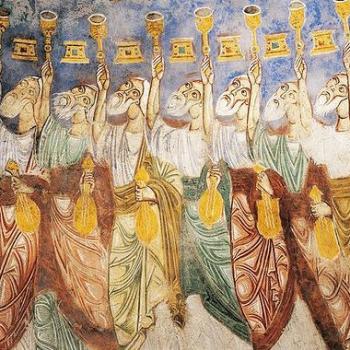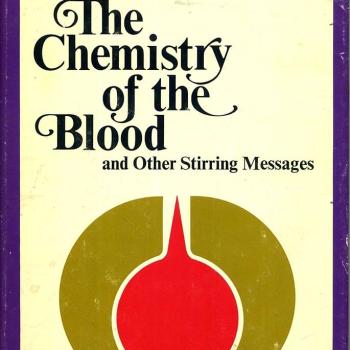Saving Hell
Now National Geographic has stepped into the evangelical debate about hell (http://news.nationalgeographic.com/2016/05/160513-theology-hell-history-christianity/) (I do not make URLs here hyperlinks because, for whatever reason, hyperlinks I include always lead to the wrong place. Please simply cut and paste the URL into a web browser to read the article “The Campaign to Eliminate Hell” at National Geographic’s web site.)
We have discussed hell here many times since the birth of this blog several years ago. I find the National Geographic article relatively accurate and helpful but missing two major alternative views—to the traditional one (“eternal conscious torment” of a quasi-physical nature in literal fire).
The alternative views mentioned in the National Geographic article are: 1) no hell (traditional universalism), 2) annihilationism/conditional immortality, and 3) eternal conscious torment without literal quasi-physical torture in literal fire (hell as hopeless absence from God’s grace).
So what are the two major alternative views missing from the article?
First, some Christians who believe in hell believe it is temporal, not eternal. These Christians may disagree about the precise nature of hell’s suffering, but they agree that it is some kind of suffering from which every person will eventually be freed. This is, of course, a kind of universalism. A prime example of someone who believes this is German theologian Jürgen Moltmann (who just turned 90 and is still active as a theologian). His universalism-with-hell view is clearly spelled out in his later works including especially The Spirit of Life and The Coming of God. For Moltmann, hell is actually purgatory but not Dante’s purgatory. Everyone in hell is there voluntarily for whatever duration they choose—until they finally give in and accept God’s loving mercy and go to heaven. As I have heard Moltmann say, “The story of God is never finished with anyone”—a German theologian’s way of saying that “the Hound of Heaven” will pursue every individual to the depths of hell until they want to leave.
Second, some Christians believe hell is eternal, at least so far as we know, but it’s “door is locked on the inside” (C. S. Lewis). This is the view depicted allegorically in C. S. Lewis’s classic book The Great Divorce and repeated (at least by suggestion or implication) in Rob Bell’s Love Wins. In this alternative view, hell is not divine punishment so much as divine provision—for those who would not want to live in heaven which includes worshiping God daily forever.
I have long espoused the “Lewis view” of hell and I call it “saving hell.”
Why does hell need saving? Well, obviously, what I mean is “saving hell from the traditional view described by Dante and Jonathan Edwards and others who depicted it as the result of God’s hate toward sinners and love of his own glory including justice. Hell needs to be saved from that traditionalist view—in which God consigns sinners to eternal conscious torment without hope out of vengeance and hate—because it portrays God as less loving than God calls us to be.
Yes, I know all the arguments against my view (which is, I am convinced, that of Lewis and Karl Barth and popularized by Bell). Traditionalists, especially in the conservative Lutheran and Reformed traditions (among Protestants), argue that hell is the result of God’s justice. I agree that it is, but God’s love and God’s justice cannot be so pitted against each other than the latter makes the former meaningless. God’s justice has to be loving and that means restorative in intention. Whether anyone in hell is ever restored to communion with God is, I think, speculative. Lewis certainly suggested it as a possibility in The Great Divorce. The main point, however, is that hell is God’s “painful refuge” provided for those who he knows would hate heaven.
Not long ago I was walking my dog in a large field near my home. It used to be a golf driving range; now it is unused. There I can let her off her leash, which she loves; she knows her boundaries and never strays into danger zones. Nobody else is there (or I don’t let her off her leash). The moment I let her off her leash that day she rushed to a small, usually vacant metal shed where the driving range, when it was active, kept its lawn mowing equipment. She sniffed around it in that distinctive way that signaled something unusual about it. She had never paid any attention to it before. So I walked around to the front of the shed, which was open, and glanced inside. There lay a man who was conscious and awake but obviously homeless and very inebriated. There were oversized beer cans strewn all around him on the dirt floor of the shed.
After I took my dog home I drove to the nearest fast food restaurant and purchased a gift card and took it to the man who thanked me. Then I called a friend who directs an organization that includes a men’s shelter where homeless men can stay if they are willing to go through detox (assuming they are inebriated). He suggested I ask the man in the shed if he is willing to go into detox and then live in the men’s shelter. When I went back to the shed the man was gone and I never saw him again.
During my phone conversation with my friend who directs the organization that includes a men’s shelter I learned that he personally knows of over a hundred men in this city of about one hundred thousand who live that way—roaming around town sleeping in temporary places (under bridges, in park shelters, in sheds, etc.)—and usually decline offers to go through detox and get help (a warm, dry place to sleep, counseling, job training, etc.). Nobody can make them go through the program; the police will only put them in a cell and then release them when they are sober. Within a month after my conversation with my friend, the local newspaper reported on two homeless men found dead in public places. Both apparently died of natural causes. This is a huge problem in our society—alcoholics and drug addicts who refuse help (even avoid it), live horribly miserable lives, and eventually die relatively young.
Many of those men and women have been offered help numerous times by many people and have refused it. When I looked at that man in his squalid “living conditions” I saw a picture of hell. Heaven is communion with God; a mature person cannot be forced into it. People in hell are those to whom God says “Not my will but thine be done.” They are like the people of Jerusalem over whom Jesus, God, wept and said “How I would have…but you would not.”
This is the only concept of hell that saves it. Does it have problems? As I have said here many times before, all theological concepts have problems. When Scripture is not as clear as I wish it where (which is often the case) I choose the theological concept that has the problems I can live with. I suppose that’s what my German theology professor Wolfhart Pannenberg meant when he said theology “guesswork.” I wouldn’t put it that way, but giving him the benefit of the doubt I assume he meant that when Scripture is not perfectly clear about something and we need a model of the reality about which we are concerned we embrace the one that makes the most sense overall. And for me, the main litmus test for that embracing (or not) is the character of God and the character of God is displayed for me in Jesus Christ.
Saving hell. This is how—the C. S. Lewis way. I wish more people knew about it. I have presented it to college and seminary students for years and most of them have said they never heard it before. Apparently the author of the National Geographic article hasn’t either.
















